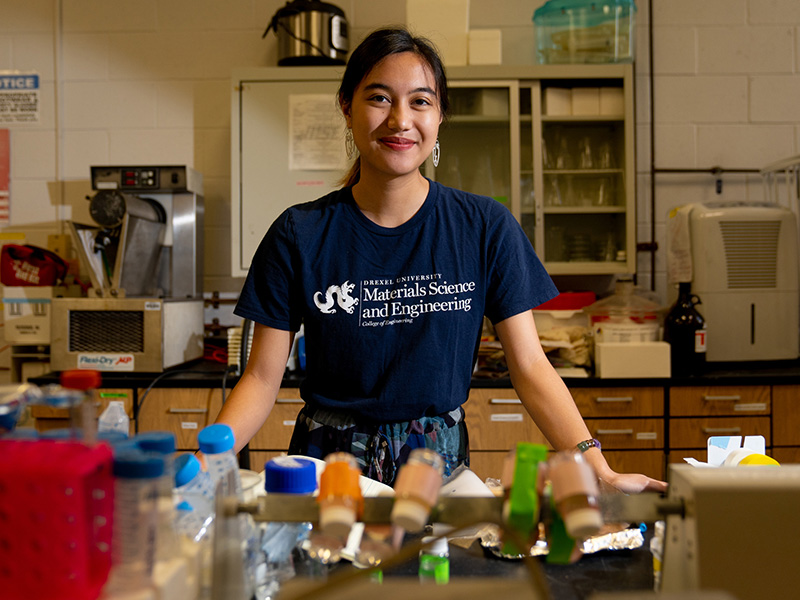
Alessandra Cabrera
Alessandra Cabrera isn’t one for standing still.
Whether she’s in the lab developing new materials or helping fellow
students, the fourth-year Dragon thrives on movement, exploration, and
discovery. Her journey into research and mentorship began early in her
Drexel career with a summer in the
STAR (Students Tackling Advanced Research) Scholars Program — an experience that set the stage for everything that followed.
The STAR Scholars Program offers highly motivated first-year students the
opportunity to engage in faculty-mentored research, scholarship, or creative
projects during the summer after their freshman year. Participants receive a
stipend and live in free on-campus housing while completing 350 hours of
faculty-guided work.
For her STAR project, Cabrera worked with
Caroline Schauer, PhD, the Margaret C. Burns Chair in Engineering and a professor of materials
science and engineering. As principal investigator in the Natural Materials
and Polymer Processing group, Schauer is developing films infused with food
waste to line cans and improve shelf life.
"In the canning industry, there’s a concept called active
packaging—packaging designed to either release chemical compounds that keep
food fresh or absorb compounds that speed up the spoiling process," Cabrera
explains. "The project focuses on a thin film used inside aluminum beverage
cans to help preserve their contents."
Cabrera helped test different formulations for these films, using spent
coffee grounds from the campus Saxby’s and leftover cranberries from a local
drink company.
"Both of these food waste products have antioxidant properties, which help
keep oxygen away from food," she says. "Once we created a polymer film, we
tested it in different liquids to make sure it would hold up in a can."
As a first-year student, Cabrera valued the opportunity to work alongside
more advanced researchers.
"It was an incredible experience—one grad student I worked closely with had
also been an undergrad at Drexel and was now pursuing her PhD," she says.
"Having that level of mentorship and seeing someone in a position I could
aspire to was inspiring."
Cabrera credits Dr. Schauer for fostering an environment that encouraged
curiosity and hands-on learning.
"She was a wonderful mentor," Cabrera reflects. "I knew that working in this
lab would give me an exploratory approach to materials science, and by the
end of the summer, I had gained hands-on experience with a variety of
techniques that I could carry forward in my academic career."
Now, as an undergraduate researcher in the
A.J. Drexel Nanomaterials Institute, Cabrera continues to build on that foundation. Her current work involves
formulating polymer-MXene composite films for multifunctional applications,
including energy storage, electromagnetic shielding, and water filtration.
She also studies the effects of post-processing techniques on these films,
further expanding her expertise in materials science.
Beyond research, Cabrera has also stepped into a mentorship role herself. As
a Lead Peer Reader at the Drexel Writing Center, she hosts the Drexel
Writing Center Podcast, facilitates professional development discussions,
and helps develop writing resources for students and faculty. Previously, as
a Peer Reader, she worked one-on-one with students across disciplines to
refine their writing, gaining expertise in linguistic diversity and
multilingualism.
Her STAR experience provided the foundation for both her research career and
her commitment to mentorship, shaping the way she approaches both science
and student support today. Now, as she helps guide other students in both
scientific and academic spaces, she continues to embody the same spirit of
inquiry and growth that first led her to materials science and engineering.